|
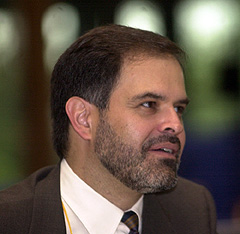 |
 |
Douglas Hykle, CMS Secretariat
|
 |
|
|
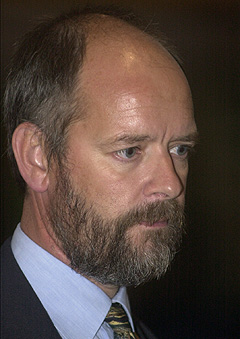 |
|
Bert Lenten, AEWA
|
|
|
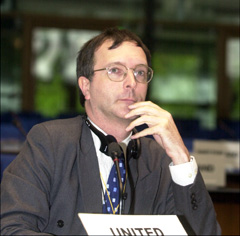 |
|
Robert Vagg, UK
|
|
|
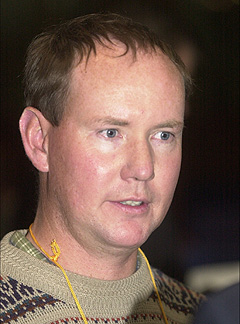 |
|
Steven Evans, South Africa
|
|
|
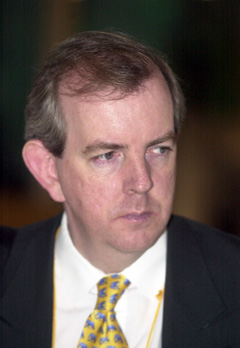 |
|
Colin Galbraith, the Chairman of the CMS Scientific Council
|
|
|
|
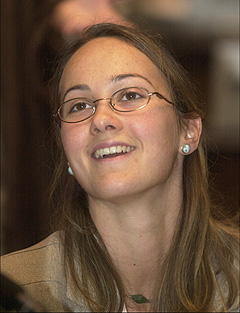 |
|
Anna Prager, Hungary
|
|
|
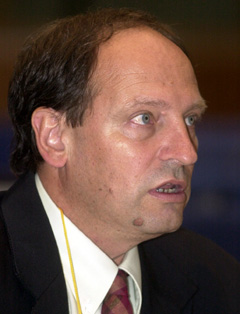 |
|
Oliver Biber, Switzerland
|
|
|
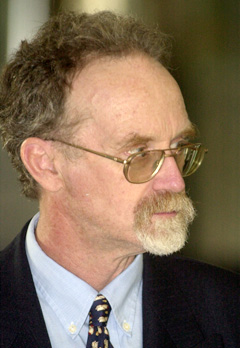 |
|
John Cooper, Coordinator, BirdLife International
|
|
|
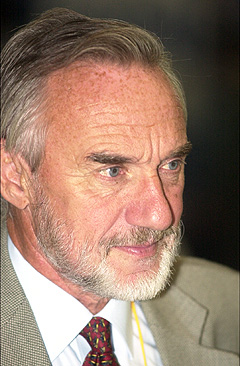 |
|
 |
 |
 |
 |
 |
|
Friday, 20 September 2002
The Plenary met briefly in the morning to hear reports on the Working Groups and the Credentials Committee. Following the Plenary, the Committee of the Whole (COW) continued its work on reviewing implementation, discussing the CMS Information Management Plan (IMP), the Global Register of Migratory Species (GROMS), cooperation with other bodies, and consideration of proposals for amendments to Appendices I and II. Working Groups met to consider the Strategic Plan, the IMP, the Budget, and African cetaceans.
PLENARY
Strategic Plan Working Group Chair Olivier Biber reported that the Group focused on objectives outlined in the review of implementation of the Strategic Plan (UNEP/CMS/Conf.7.10). Reporting on the work of the drafting group to prepare a resolution on concerted actions, Scientific Council Chair Galbraith requested a further meeting to finalize the draft. Credentials Committee Chair Tatwany reported that 49 of the 65 registered countries have their credentials in order.
COMMITTEE OF THE WHOLE
CMS INFORMATION MANAGEMENT PLAN: CMS Deputy Executive Secretary Hykle introduced the CMS IMP document, highlighting close collaboration with UNEP-WCMC and linkages with the synthesis of national reports. UNEP-WCMC outlined the benefits of the IMP, including access to information on species and themes, and recommended linking this system with the CBD Clearing House-Mechanism. The COW established a working group to undertake a review of the information system, with SWITZERLAND suggesting inclusion of the Global Biodiversity Information Facility in its framework. The EU requested better integration of the GROMS into the CMS information strategy and urged the CMS Secretariat to take the lead in developing an information plan in collaboration with other organizations. GERMANY called for harmonization of all available information tools.
GLOBAL REGISTER OF MIGRATORY SPECIES (GROMS): CMS Executive Secretary Müller-Helmbrecht reviewed progress on the GROMS, suggesting that UNEP-WCMC should manage the register, and calling for more financial contributions. The PHILIPPINES drew attention to the South-East Asian database network on migratory species and suggested linking it with the GROMS. SENEGAL, on behalf of African countries, called for capacity building and identifying focal points. ZIMBABWE proposed improving maps by detailing animal density and their migratory passage routes. Klaus Riede (Germany) acknowledged the proposals and suggestions, and requested additional funding and networking to develop the GROMS. The COW established a working group to further work on the GROMS.
|
|
|
|
COOPERATION WITH OTHER BODIES: COW Chair Ignacio introduced a document on cooperation with other bodies. Müller-Helmbrecht underscored this as a key document and highlighted the "enormous progress" made in networking with other international bodies. Noting that the aims of the CMS complement those of the CBD, he called for further collaboration and synergies. He added that the CMS Secretariat had signed MOUs with the Secretariats of the International Whaling Commission (IWC), CITES, the Ramsar Convention and UNESCO, and is finalizing a Joint Work Programme with the Ramsar Secretariat. Müller-Helmbrecht also highlighted cooperation with Wetlands International, IUCN, and the UN Convention to Combat Desertification (UNCCD).
NEW ZEALAND supported the development of strong collaborative arrangements, but recommended consultations to address financial implications and to consider each body's priorities. SIERRA LEONE supported cooperation with the UNCCD, and SENEGAL called for subregional cooperation and promoting transboundary reserves. Observing that many migratory species are wetland dependent, a Ramsar Convention representative drew attention to its Joint Work Programme with the CMS. Müller-Helmbrecht emphasized that the CMS capacity limitations hinder its ability to liaise with regional Conventions.
GUIDELINES FOR HARMONIZATION OF FUTURE AGREEMENTS: Müller-Helmbrecht requested COP guidance on carrying out the work on guidelines on the harmonization of future agreements. SWITZERLAND and MONACO proposed abandoning the idea of harmonization guidelines. GERMANY suggested that guidelines be developed on practical aspects that would promote the development of regional instruments.
|
|
|
|
PROPOSALS FOR AMENDMENTS TO APPENDICES I AND II: COW Chair Ignacio and the Secretariat introduced documents on proposals for amendments to Appendices I and II. Scientific Council Chair Galbraith informed Parties that due to information gaps in the Australian proposal to list six whale species in Appendices I and II, the Council supports listing only three of the species (Fin Whale, Sei Whale and Sperm Whale) in both Appendices I and II, and three (Antarctic Minke Whale, Bryde's Whale and Pygmy Right Whale) in Appendix II only. AUSTRALIA agreed to revise its proposal in accordance with the Council's recommendations, and welcomed the invitation to develop its proposals further. NORWAY opposed any whale species listings, underlining that IWC, CITES, IUCN and FAO already address issues relating to whales. He noted that the rate of decline for the Sei and Fin Whale populations does not meet Appendix I criteria. The EUROPEAN COMMUNITY, MONACO, THE PHILIPPINES, SOUTH AFRICA, GERMANY, NEW ZEALAND, INDIA, PERU, CHILE, ARGENTINA, URUGUAY, SLOVENIA, BULGARIA, and the WHALE AND DOLPHIN CONSERVATION SOCIETY (WDCS) supported Australia's revised proposal. MONACO, PERU, BULGARIA and SLOVENIA drew attention to the precautionary principle.
 Listen to Colin Galbraith Listen to Colin Galbraith
 Listen to Australia Listen to Australia
 Listen to Germany Listen to Germany
 Listen to Monaco Listen to Monaco
 Listen to the Whale and Dolphin Conservation Society (WDCS) Listen to the Whale and Dolphin Conservation Society (WDCS) |
|
|
|
AUSTRALIA also introduced its proposals, endorsed by the Scientific Council, to list the Killer Whale in Appendix II and the Great White Shark in Appendices I and II. Concerning the Great White Shark, NORWAY opposed the listing of either species, while the EC reserved its position until it receives more information.
PERU, supported by ARGENTINA and URUGUAY, proposed listing the South American Sea Lion and South American Fur Seal in Appendix II. These proposals, as well as Ghana's proposal to list the West African Manatee and Peru's proposal for the Amazonian Manatee, were accepted without reservations.
Stressing the unfavourable conservation status of the Gangetic River Dolphin and the Scientific Council's support for including it in Appendix I, INDIA requested that attention be paid to the proposal despite its late submission to the Secretariat. Hykle said the proposal would be circulated and considered by the COW at a later stage.
Concerning terrestrial mammals, Roseline Beudels, for the CMS Scientific Councillor for terrestrial mammals, stressed the Scientific Council's approval for listing the Wild Bactrian Camel in Appendix I. She noted the unfavourable conservation status of the Asiatic Wild Ass, Goitered Gazelle and Mongolian Gazelle, and the very unfavourable status of the Saiga Antelope. She highlighted the Council's recommendation that these species be listed in Appendix II. The COW agreed to recommend these amendments to the Plenary.
John O'Sullivan, CMS Scientific Councillor for birds, explained that the Scientific Council had recommended 15 species for listing in Appendix I and four species for listing in Appendix II. SENEGAL, The EU, HUNGARY, SPAIN and others supported inclusion of the European Turtledove in Appendix II. ZIMBABWE and MALI opposed its inclusion, highlighting that doves are abundant and commonly hunted in Africa. NORWAY requested withdrawing this proposal on the grounds that the dove is a common species. MOROCCO and EGYPT deferred listing the species until more information becomes available on its status. The COW agreed to forward all the other proposals to Plenary.
|
|
|
WORKING GROUPS
BUDGET WORKING GROUP: The Budget Working Group, chaired by Robert Vagg (UK), discussed the revision of the proposed budget for 2003-2005. Parties agreed that the proposed budget was too high and should be reduced. They sought clarification on various items, including staffing and regional agreements. The Secretariat cited funding for conservation measures, implementation measures and agreement development as a major source of the increase in core budget, and added that the additional costs are modest in relation in other conventions. An NGO appealed to delegates not simply to consider the increase in terms of percentage, but to note that the actual sums involved are not large. Delegates requested the Secretariat to produce three alternative budget proposals that reflect 0%, 10% and 20% increases from the last budget for discussion at the next working group meeting.
 Listen to Arnulf Müller-Helmbrecht, CMS Executive Secretary Listen to Arnulf Müller-Helmbrecht, CMS Executive Secretary |
|
|
|
IMP WORKING GROUP: The Information Management Plan Working Group, chaired by Gerardo Fragoso (UNEP-WCMC), met in the afternoon to discuss the usefulness of the CMS web-based library for dissemination of information. Delegates noted the financial difficulties that developing countries, NGOs and others encounter in accessing information, and the resulting inability to appraise scientific developments.
AFRICAN CETACEANS WORKING GROUP: This Group, chaired by Demba Mamadou (Senegal), met in two sessions to develop a MOU on West African cetaceans. Participants also discussed the need for a CMS regional coordinator for Africa and for the development of a MOU on the African Elephant.
|
|
|
STRATEGIC PLAN WORKING GROUP: This Group met in the evening, with participants debating views on the nature and scope of its work. Chair Biber highlighted the Group's role in considering general priorities and items that are relevant to the budget. Scientific Council Chair Galbraith said that identification of priorities for action under the Strategic Plan would be assisted by redefining the modus operandi. Chair Biber questioned whether further intersessional consideration of these matters might be useful. Delegates also commented on a written report on the Group's first meeting, prepared by rapporteur Diane Mortimer (UK).
|
|
|
 |
Olav Bakken Jensen, Ministry of Environment, Norway.
|
|
|
 |
|
|
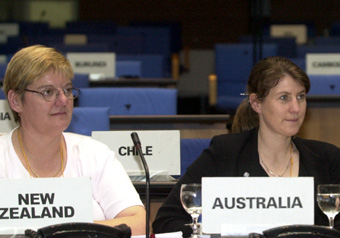 |
|
Jennifer Macmillan (left) with Frances Verrier, Australia
|
|
 |
Gerhard Emonds (right), with Joachim Schmitz, Germany
|
 |
|
|
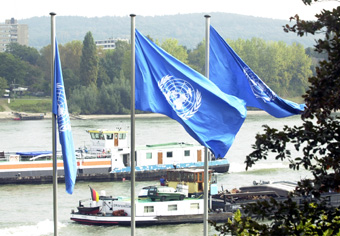 |
|
Boats traveling the Rhine, a view from the conference center
|
|

